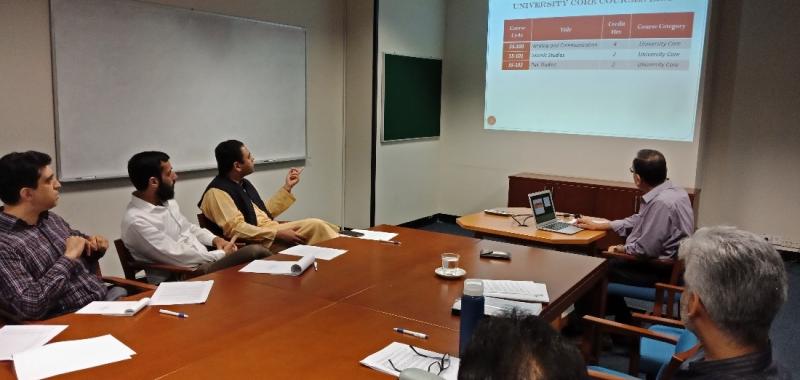
Led by Dr. Nadeem Khan, Associate Professor, Department of Electrical Engineering, the undergraduate curriculum committee (UGPC) of the department of Electrical Engineering (EE) at Syed Babar Ali School of Science and Engineering (SBASSE) conducted three activities related to the outcome-based education (OBE). These include the TGIF Meeting on PEC accreditation requirements, TA training meeting regarding making of course file, and a seminar for Instructors on Defining and Assessing Learning in Courses – An Objective Approach.
The TGIF Meeting on PEC accreditation requirements provided in depth information for creating and maintaining course files. The CLO/PLO design guidelines were also discussed in detail. Thorough discussions between the UGPC and the SBASSE faculty members led to an extensive understanding of the PEC accreditation requirements for the EE programme.
Meanwhile, the TA training meeting regarding making of course file was geared towards all teaching assistants of the EE department. This session provided through information on maintaining course files. A document detailing various aspects of a course file was also shared with the participants.
Thirdly, the seminar for instructors on Defining and Assessing Learning in Courses – An Objective Approach provided the opportunity to the Electrical Engineering Department of SBASSE to share its experience and requirements with regard to the implementation of Outcome Based System in its undergraduate EE programme. The seminar highlighted how teachers, students, and institutions can benefit in terms of improving the teaching and learning process out of the paper work associated with the OBE system, which is generally perceived as a hurdle in its implementation.
The LUMS EE undergraduate programme is among the few engineering programmes that is accredited by the PEC as a Tier-2 accredited programme. It also enjoys the status of being treated under the Washington Accord as a Bachelors programme whose degree holds equivalence to Engineering degrees earned in the member states including US, UK, Japan, Australia, Singapore, Malaysia etc.








